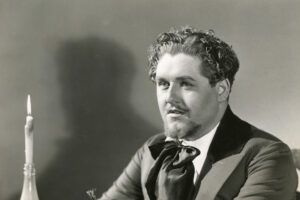

After her controversial Maria Stuarda and an appearance at last fall’s Richard Tucker Foundation gala where she plowed her way through alarmingly strident renditions of Bellini and Rossini arias, it was gratifying to discover DiDonato returning to fine form with her Angelina, an interpretation which emphasized the character’s spunky commitment to improving her sorry lot in life despite the abuse of her brutal stepfather. Although her art has grown increasingly calculated and her high notes have acquired a driven quality, she remains an appealing mistress of Rossini style, adding effortless sprays of dazzling ornaments to her already challenging music. While I predict next season’s Elena in La Donna del Lago will be another ideal fit, I have doubts about a rumored Semiramide in the Yankee diva’s future.
She could hardly have had a more ardent prince: Camarena continued his conquest of New York with an elegant Ramiro bursting with vocal sunshine and pinging high notes. After his breakout Elvino just last month in La Sonnambula, the Met was extraordinarily lucky to secure the Mexican tenor to replace Juan Diego Flórez who withdrew from this revival’s first three performances. Although many are no doubt eager to hear Flórez return to a role he’s not sung here in twelve years, I suspect few were upset to encounter Camarena whose performances this season have been indelibly suffused with an infectious joy of singing, despite some unfortunate aspiration in his florid singing as the prince. A recent interview with the tenor in the New York Times revealed the grand news that that plans are afoot to ensure he will be a frequent visitor.
Pietro Spagnoli made a stellar Met debut as the Prince’s valet, his bright secure baritone confidently commanding Dandini’s challenging music, although his bravura entrance aria failed to fully come off. Once past it, Spagnoli relished his role as the stand-in for his master delightedly humiliating the cringingly ambitious Don Magnifico and his wildly over-the-top daughters.
Except for the 2005 run with Olga Borodina, Alessandro Corbelli has sung in every Met performance of Cenerentola. Initially the Dandini, he has now become the international go-to Magnifico. Happily he does not shirk the character’s fatuous cruelty and his pungent Italian delights; however, his bone-dry baritone disappoints. I prefer a more bass-oriented Magnifico and one with more sheer voice: whenever I think of Rossini’s basso buffo roles, I recall what a revelation Samuel Ramey was as Mustafà in L’Italiana in Algeri, a singer in his prime really singing the music rather than the threadbare buffo’s barking one often hears. More than once I wondered what Spagnoli or Luca Pisaroni, the accomplished Alidoro, might instead sound like in Magnifico’s three showpiece arias.
Cesare Lievi’s busy 1997 production in Maurizio Baló’s spare sets holds up well enough with its striking Magritte-influenced white-faced, red-cheeked male chorus in signature black or red bowler hats, but too often it relies on tired gags it beats into the ground. I lost count how many times someone fell off the large, unbalanced red sofa and the desperately unfunny antics of the stepsisters grow more annoying with each revival despite the brave efforts Monday of Patricia Risley and Rachelle Durkin, who was much funnier as Lisa in the recent revival of Mary Zimmerman’s Sonnambula.
By far my favorite Rossini opera—and written in an astonishing 24 days, Cenerentola will always remind me of the great Claudio Abbado who died three months ago. The first time I ever heard the opera was an NPR broadcast I taped from La Scala’s fabled 1976 visit to the Kennedy Center featuring a crackerjack Italian Rossini ensemble he had assembled, including Lucia Valentini-Terrani, Margherita Guglielmi (an ideal Clorinda), Enzo Dara, Paolo Montarsolo and Claudio Desderi.
Abbado’s breathtaking Rossini has been criticized as heartless by some, particularly compared with that of the more humane Vittorio Gui; however, I adore its vivacity and brilliance, and happily Fabio Luisi in his first appearance on the MET podium this season appears to subscribe to this vivacious style as well. While there was more than one breathless mishap when the singers and orchestra lost contact, more often this was a Cenerentola of exhilarating verve– truly la bontà in trionfo! I expect stage-pit coordination will improve as the run continues, but one must hurry to hear Camarena who sings only two more performances before Flórez returns for the final three.
Remarkably, the four most successful stage adaptations of Cinderella are all on view this spring in New York City: on Wednesday Juilliard Opera premieres its new production of Massenet’s Cendrillon while a revival Rodgers and Hammerstein’s musical comedy originally conceived for television continues on Broadway starring Carly Rae Jepson (?) and Fran Drescher (!). After the Met ends its season, the American Ballet Theatre returns with its usual roster of full-length ballets including a week of performances in June of Frederick Ashton’s beloved spin on the story of Charles Perrault’s put-upon heroine featuring Prokofiev’s ravishing score.
Might I make a request for an upcoming installment of the invaluable series here drawn from the Mike Richter CD-Roms? Perhaps when the Teatro Colón Ring is completed I would recommend a fizzy 1969 San Francisco Cenerentola–the world-premiere of the legendary Jean-Pierre Ponnelle production—splendidly conducted by Charles Mackerras and with the ideally matched lovers of Teresa Berganza and the underrated Pietro Bottazzo.
Photos: Ken Howard



























Comments